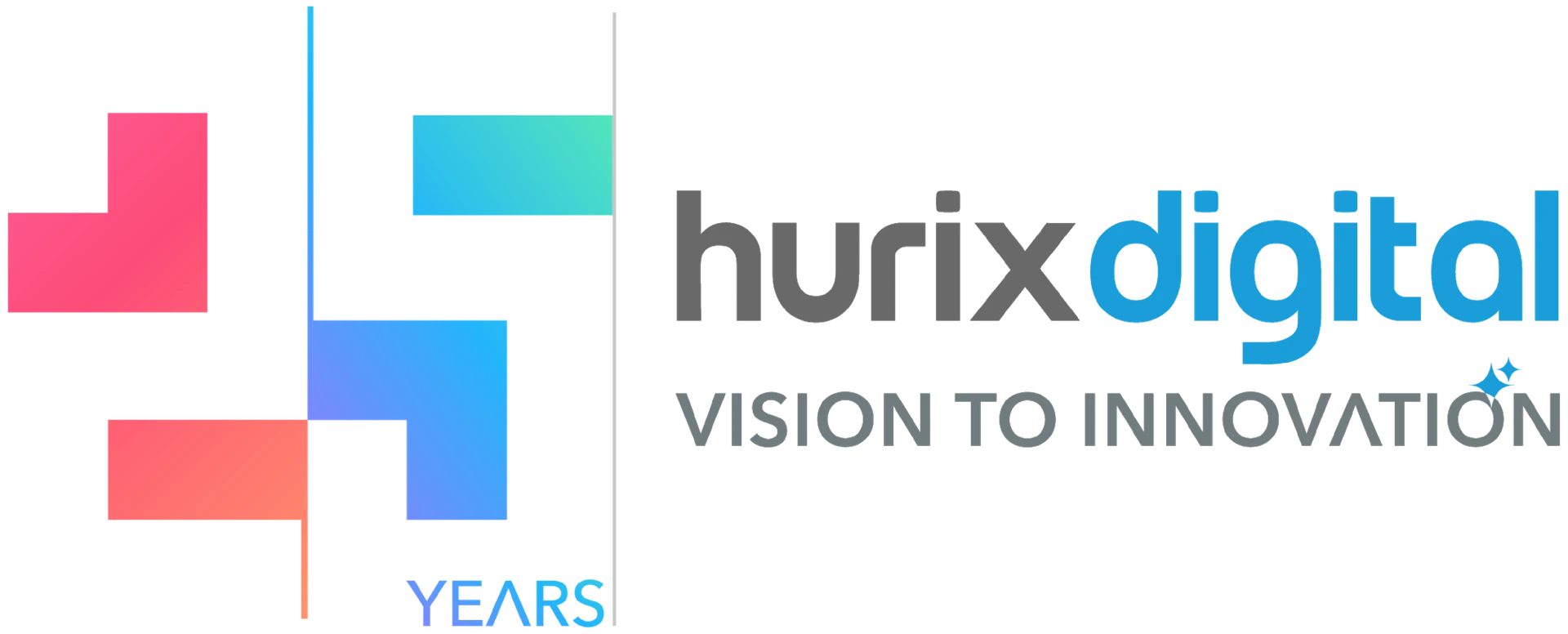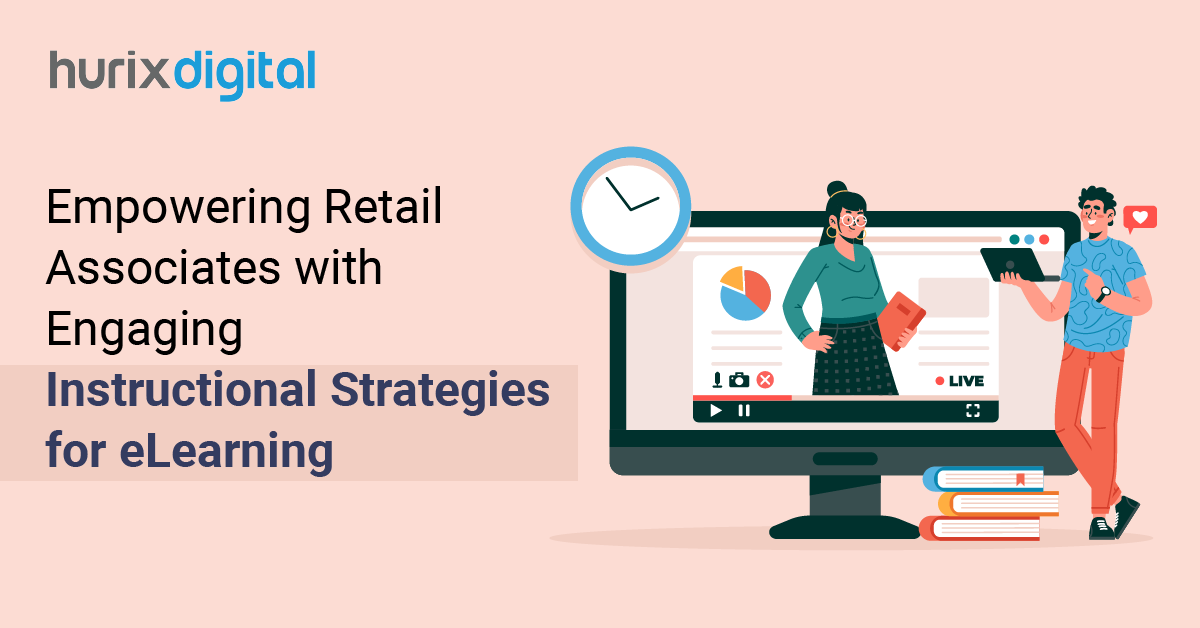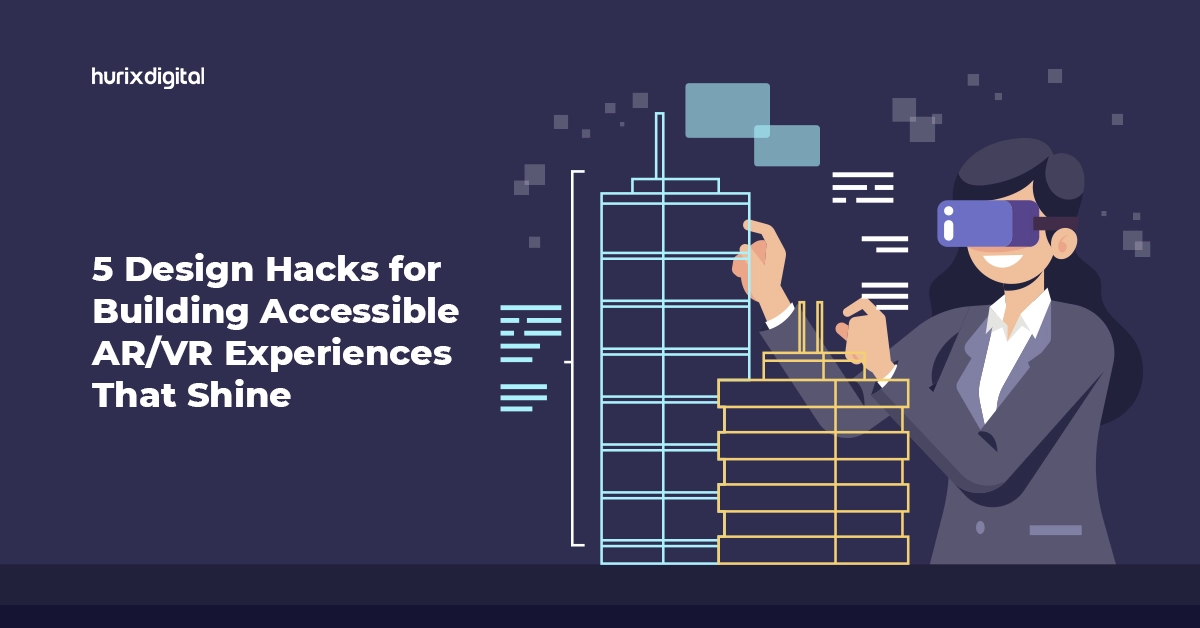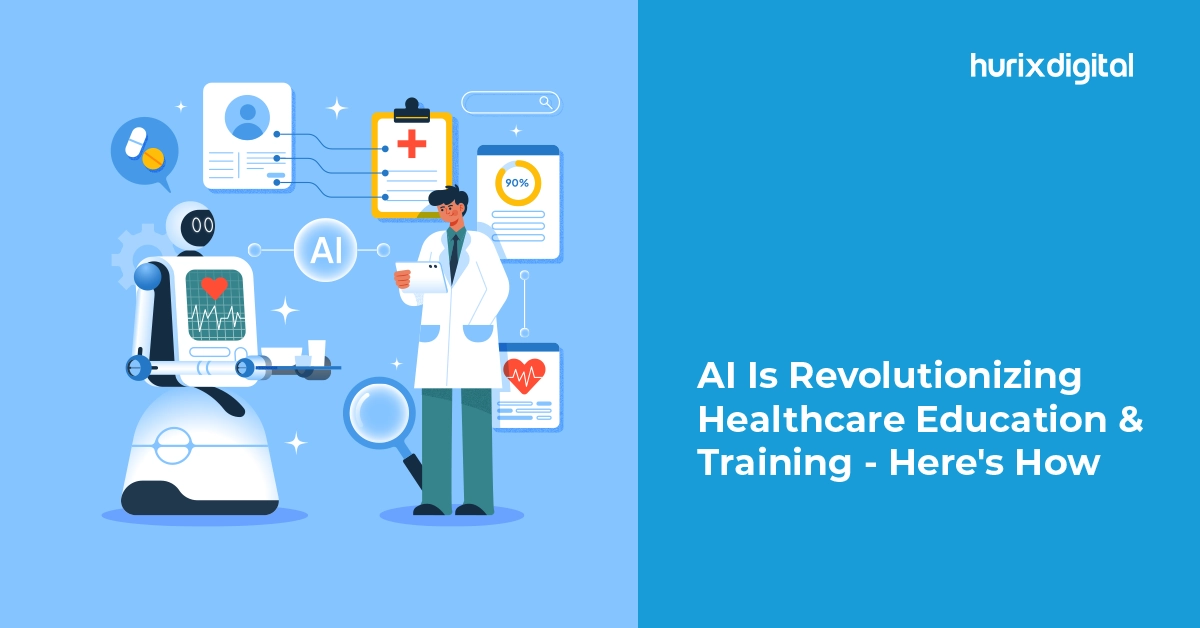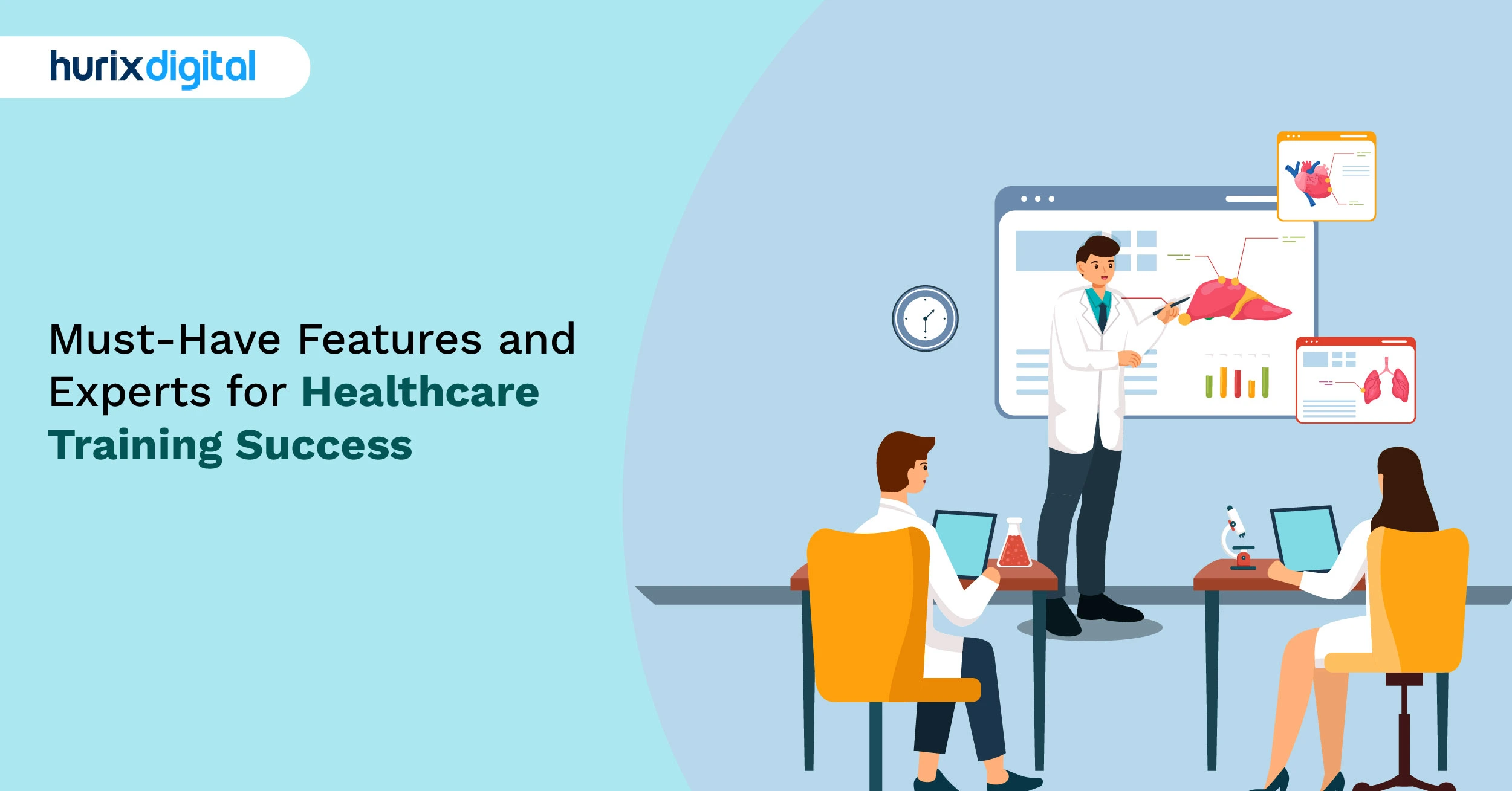
Must-Have Features and Experts for Healthcare Training Success
Summarize with:
Every hospital helps thousands of lives daily and undoubtedly aims to deliver the best healthcare for every patient. After all, the comfort, happiness, and safety one feels when they know they’re in good hands are massive steps in recovery and treatment.
Beyond recovery, patients must feel confident that their issues will be understood, empathized with, and treated promptly, to consider returning to a hospital in case of recurring issues or new illnesses. That is why upskilling is necessary to keep up with the times.
As you continue reading, we will take you through hospital learning program concepts, impact, and future.
Table of Contents:
- Hospital Learning Programs and Why They are Used
- Understanding the Objectives of a Healthcare Training Program
- The Triple Impact of Learning Programs in Hospitals
- What is a Healthcare Instructional Designer?
- Why Do You Need a Healthcare Instructional Designer?
- Top 5 Features that All Healthcare Training Programs Must Have
- 10 Ways to Plan a Robust Healthcare Training Strategy
- Evaluate Present Skills and Expertise
- Establish Organisational Objectives
- Seek the Viewpoint of Important Stakeholders
- Keep Up with Technological Advancements
- Be Mindful of Regulations
- Provide Role-Specific Instructions
- Focus on Soft Skills
- Opt for a Blended Learning Approach
- Promote Continuous Learning Opportunities
- Track, Assess, and Evaluate Regularly
- Imbibing the Future Into Hospital Learning Programs
- Takeaway
Hospital Learning Programs and Why They are Used
Every industry and business invests in upskilling and educational initiatives to enhance the capabilities of its professionals; with the medical sector in focus, the pursuit of faster and more robust treatment requires constant evolution.
Amidst this constant evolution, hospitals invest their resources to deliver top-notch hospital learning programs for these two goals:
- To improve their operational excellence by keeping their experts qualified, efficient, and relevant to the latest medical treatments and practices.
- To upgrade the care they deliver to their patients with soft skills such as compassion and interpersonal communication.
Right from doctors and nurses to technical and emergency support staff, healthcare learning programs incorporate many forms, from hands-on training modules to full-fledged digital workshops, to target these two goals.
Understanding the Objectives of a Healthcare Training Program
In any effective training plan, clarity about the objectives is crucial. These objectives serve as guiding principles and ensure the training remains focused and purpose-driven. Let’s look into the key goals that a healthcare training program should aim to achieve:
- Skill Development: The primary objective of any healthcare training program is to equip participants with the necessary clinical and technical skills. This includes hands-on training in procedures, diagnosis, treatment, and patient care. Skills development is the foundation upon which healthcare professionals build their competence.
- Knowledge Acquisition: Healthcare professionals must have a strong theoretical foundation beyond practical skills. Training programs should impart comprehensive medical knowledge, keeping participants up-to-date with the latest advancements in their field.
- Patient-Centered Care: Healthcare isn’t just about treating conditions; it’s about caring for individuals. A crucial objective of training programs is to instill a patient-centered approach, emphasizing empathy, communication, and the importance of understanding each patient’s unique needs and preferences.
- Ethical and Legal Understanding: Healthcare professionals must navigate complex ethical and legal landscapes. Training programs should ensure participants are well-versed in medical ethics, patient confidentiality, informed consent, and legal obligations to provide safe and responsible care.
- Critical Thinking and Problem-Solving: Healthcare is full of challenges and unexpected situations. Training programs should foster critical thinking skills, enabling professionals to analyze complex situations, make informed decisions, and adapt to evolving patient needs.
- Interdisciplinary Collaboration: Healthcare is a team effort, and effective collaboration between healthcare professionals is essential. Training should emphasize the importance of teamwork in a healthcare setting, effective communication, and the ability to work seamlessly with other healthcare providers.
- Cultural Competence: In today’s diverse world, healthcare professionals must be culturally competent to provide care that is sensitive and respectful of diverse backgrounds and beliefs. Training programs should promote cultural awareness and competence.
- Continuous Learning: Healthcare is a dynamic field, and professionals must commit to lifelong learning. Training programs should instill a culture of continuous improvement and the importance of staying updated with the latest research and medical advancements.
- Quality and Safety: Patient safety is paramount. Training programs must emphasize the importance of adhering to rigorous quality standards, infection control protocols, and error prevention measures to ensure the highest level of patient safety.
- Leadership and Management: For those in leadership roles within healthcare, training should include principles of leadership, management, and healthcare administration, ensuring that healthcare organizations are well-run and efficient.
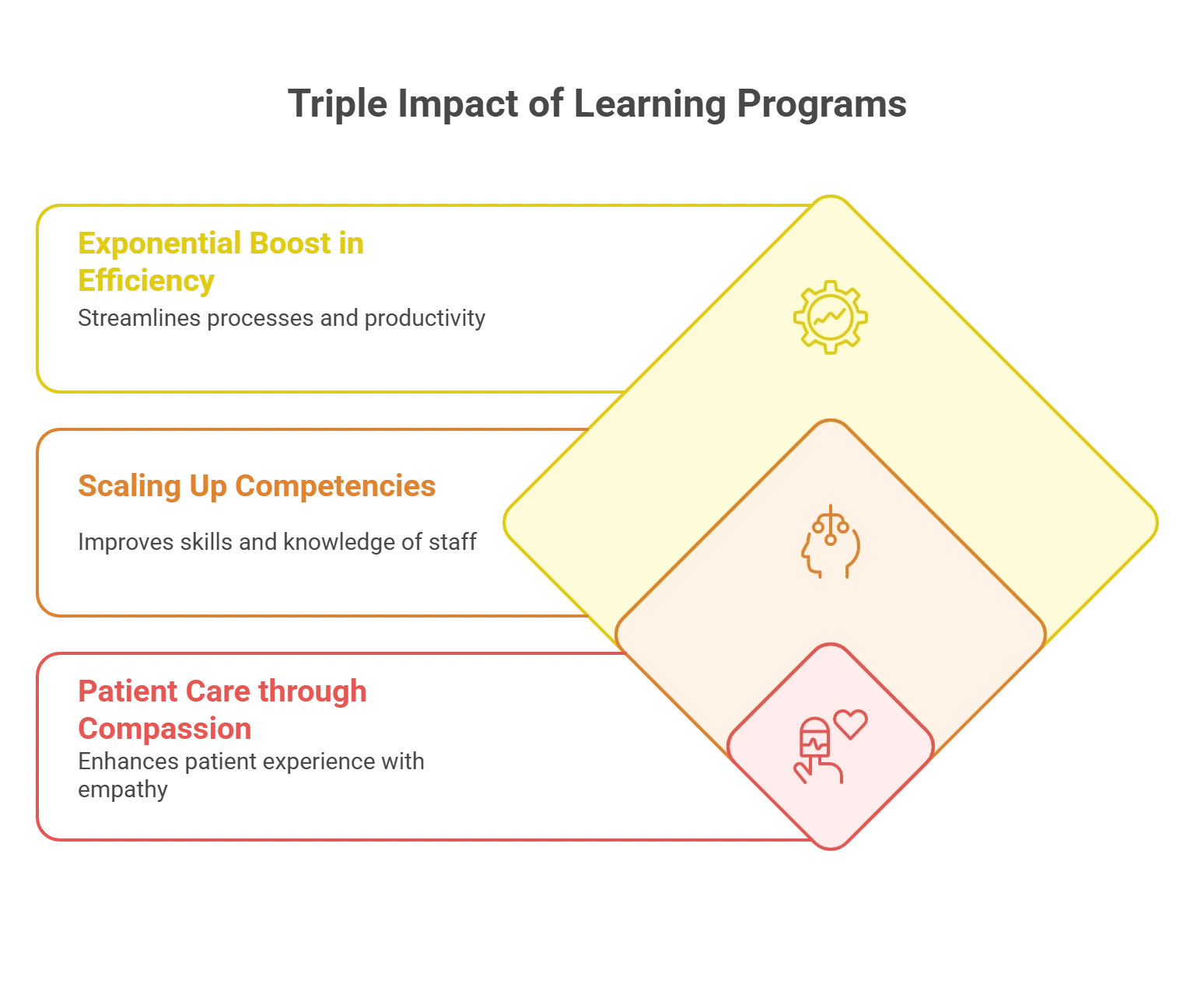
The Triple Impact of Learning Programs in Hospitals
The true impact of healthcare professional development is best explained through these three most crucial benefits,
1. Exponential Boost in Efficiency
Here is how hospital learning programs can potentially improve hospital efficiency:
- Critical patient care contact points, such as emergency medical technicians (EMTs) and nurses, can dramatically improve their swiftness and reduce the time for diagnosis.
- Doctors can be better equipped to reduce surgery durations. Shorter surgery durations increase the number of patients that can be attended to and can also reduce potential side effects during surgeries.
2. Scaling Up Competencies
With well-delivered learning modules, here are the areas where healthcare professionals boost their competencies:
- With hospital learning programs that use advanced medical equipment, surgeons and doctors will be more qualified to increase the probability of success in complicated treatments.
- When nurses, EMTs, and doctors are trained to use digital health recording devices, more reliable healthcare data can be digitally stored, thus enabling faster, historical, evidence-based diagnosis. Technologically competent staff can also read patient changes through devices that offer real-time data.
3. Patient Care through Compassion
In the healthcare industry, hospitality serves an essential purpose. Here’s how learning modules focused on soft skills benefit hospital staff:
- Hospital learning programs can improve good communication, which actively helps gain a patient’s trust and readiness to follow through on important follow-ups.
- Compassion can elevate the quality of patient care. Learning modules that help improve empathy and sociocultural interactions can help patients feel at ease and comfortable.
The triple impact of hospital learning programs is best delivered through e-learning solutions. Let’s now read about a few learning methods that can be incorporated into some programs!
What is a Healthcare Instructional Designer?
A healthcare instructional designer applies the principles and practices of instructional design to create customized training solutions for the healthcare industry. Their role involves the following:
- Analyze the learning needs and goals of the target audience
- Design the learning objectives and strategies
- Develop the learning content and activities
- Implement the learning solution
- Evaluate its effectiveness and impact
Additionally, a healthcare instructional designer has specialized knowledge and skills in healthcare compliance training, such as medical terminology, clinical procedures, regulatory standards, and ethical issues.
As they understand the challenges and opportunities of healthcare education, they can create relevant, realistic, and engaging learning solutions for healthcare professionals.
Why Do You Need a Healthcare Instructional Designer?
Some instructional design benefits in the healthcare sector include:
- Improving the quality and consistency of your healthcare training programs
- Enhancing the learning outcomes and retention of your healthcare professionals
- Increasing the compliance and performance of your healthcare workers
- Reducing the risks and costs of errors and malpractice in healthcare delivery
- Boosting the reputation and competitiveness of your healthcare organization
A healthcare instructional designer can also help you leverage the latest technologies and trends in healthcare e-learning, such as:
- Mobile learning allows your healthcare professionals to access learning content anytime, anywhere, and on any device
- Microlearning delivers bite-sized and focused learning modules that are easy to consume and remember
- Gamification adds elements of fun and competition to your learning content, such as points, badges, leaderboards, and rewards
- Simulation creates realistic and immersive scenarios that allow your healthcare professionals to practice and apply their skills in a safe and controlled environment
- Artificial intelligence enables personalized and adaptive learning experiences that cater to the individual needs and preferences of your healthcare professionals
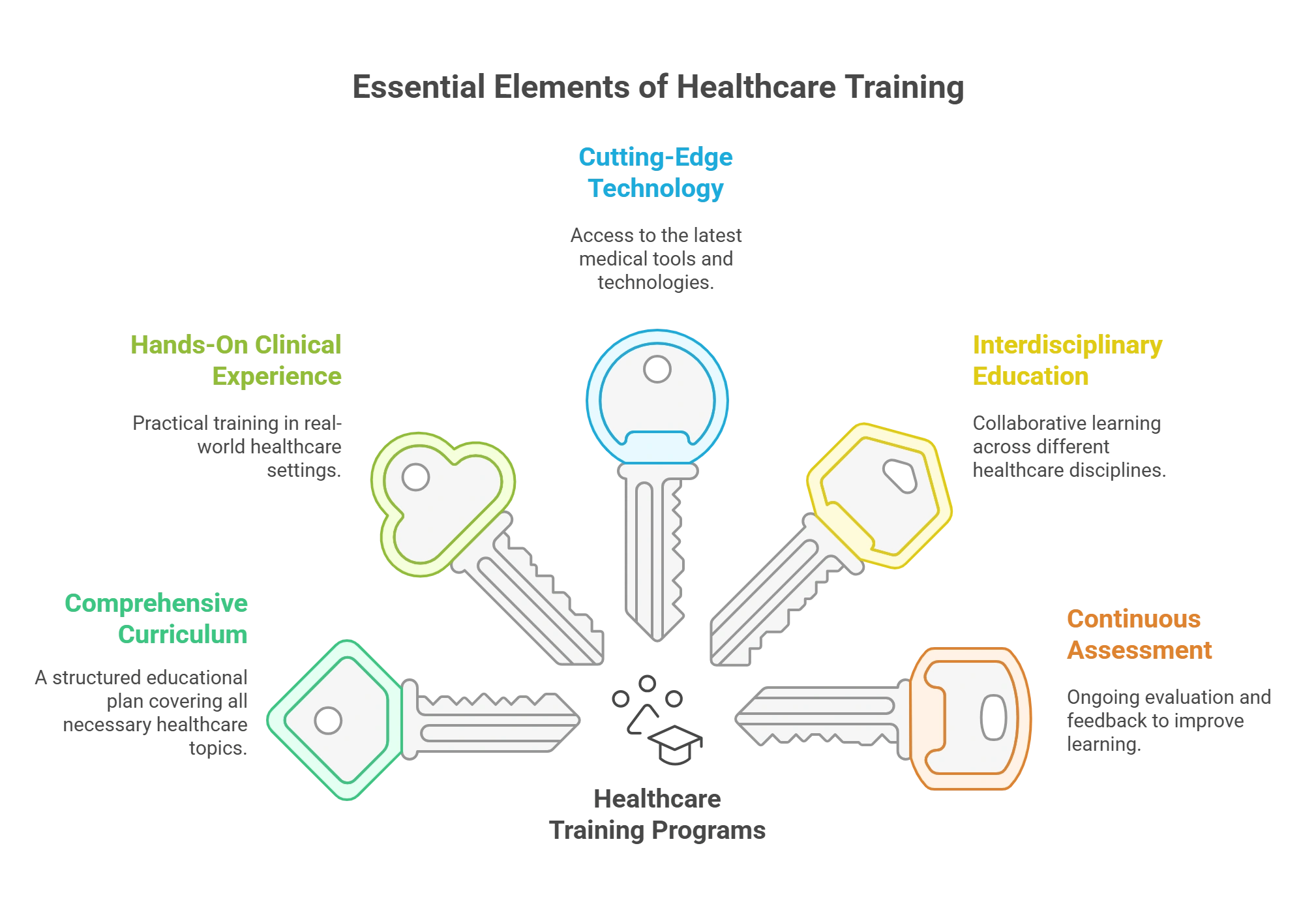
Top 5 Features that All Healthcare Training Programs Must Have
The importance of staff training in healthcare cannot be understated. It plays a pivotal role in shaping the competence and expertise of future healthcare professionals. Whether an aspiring doctor, nurse, pharmacist, or other healthcare provider, the quality of their training program can significantly impact their ability to provide excellent patient care.
Here are the top five features that all training programs for healthcare professionals must incorporate to ensure their effectiveness:
1. Comprehensive Curriculum
A robust and comprehensive curriculum is the cornerstone of any healthcare training program. It should cover a wide range of topics relevant to the specific field of study. This includes foundational sciences, clinical skills, patient care, medical ethics, and legal considerations.
Furthermore, a well-structured curriculum ensures that students gain a deep understanding of the field, preparing them for the challenges they will face in real-world healthcare settings.
2. Hands-On Clinical Experience
Healthcare is a practical profession, and hands-on experience is invaluable. Training programs must provide students with ample opportunities for internships and practical skills training.
A great example of this is scenario-based learning. These programs empower healthcare trainees by immersing them in real-world medical situations. Through interactive simulations and tailored scenarios, trainees gain valuable hands-on experience, enhancing their decision-making skills and boosting confidence in critical patient care situations.
This immersive approach ensures more effective and competent healthcare professionals.
3. Access to Cutting-Edge Technology
Medicine and healthcare are constantly evolving with new technologies and treatment modalities. Training programs should have access to state-of-the-art simulation training labs, digital tools, and resources such as training management systems. Exposure to cutting-edge technology ensures that healthcare professionals are well-prepared to embrace innovation and provide the best possible care to patients.
4. Interdisciplinary Education
Collaboration is fundamental to healthcare, and training programs should reflect this reality. As stated above, healthcare professionals often work in interdisciplinary teams. Hence, teamwork and collaboration in healthcare training solutions must be reinforced actively.
This interdisciplinary education helps students understand the roles and responsibilities of different healthcare providers, fostering a more cohesive and patient-centric approach to care.
5. Continuous Assessment and Feedback
Regular assessment and feedback mechanisms are essential to ensure students progress and meet the program’s objectives. This includes written exams, practical evaluations, clinical assessments, and feedback from instructors and preceptors.
Leveraging digital tools can enhance continuous assessment and feedback in training through regular quizzes, assessments, and knowledge checks integrated into the learning modules to gauge trainee progress.
Additionally, interactive elements like peer evaluations and instructor feedback facilitate ongoing performance assessment. This multi-faceted approach helps learners track their development and receive timely input for continuous improvement throughout the training program.
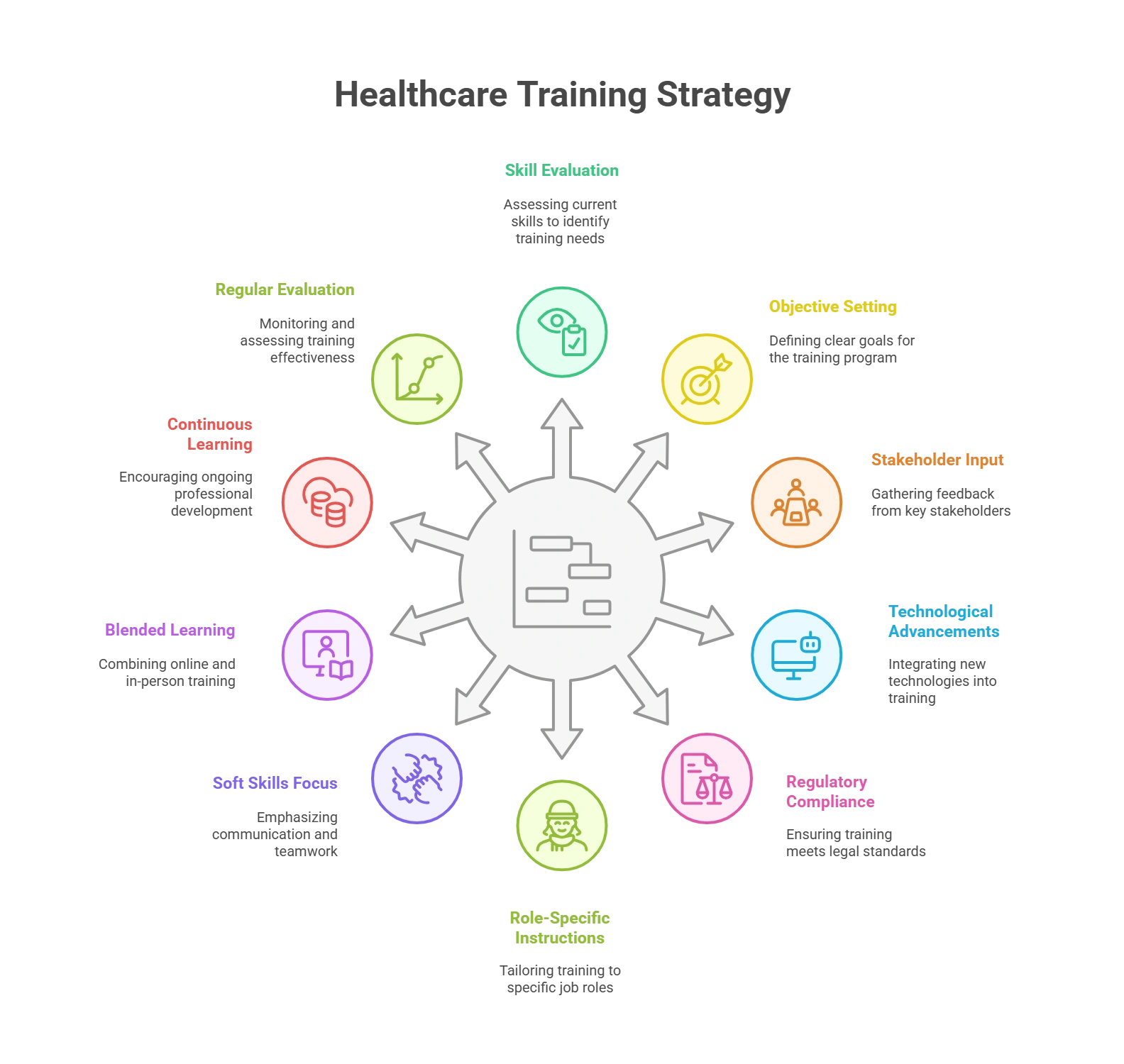
10 Ways to Plan a Robust Healthcare Training Strategy
To maximize the efficacy and impact of your training initiatives, you must tailor your training strategy according to the unique needs of your organization. You may cultivate a workforce that is more capable and involved by customizing the program to your healthcare organization’s specific needs and objectives.
When planning your healthcare training strategy, keep the following points in mind:
1. Evaluate Present Skills and Expertise
Begin by conducting a comprehensive evaluation of your employees’ present-day abilities and expertise. Determine your strengths and areas for development. This evaluation will serve as a basis for creating customized training programs.
2. Establish Organisational Objectives
Establish your medical facility’s precise goals and mission. Are you trying to increase the uptake of novel technologies, lower medical mistakes, or increase patient contentment? Make sure your healthcare training best practices align with these objectives to give your employees the tools they require to contribute to the company’s success.
3. Seek the Viewpoint of Important Stakeholders
Make sure you involve important stakeholders, such as department heads, executives, and medical personnel, in the development of the training strategy. Their viewpoints and insights will enable you to secure support from all levels of the organization and obtain a thorough grasp of its requirements.
4. Keep Up with Technological Advancements
Stay current with the most recent developments in healthcare technology. Include training on new medical devices, EHRs, telemedicine, and other cutting-edge technologies pertinent to your organization’s work.
5. Be Mindful of Regulations
Make sure that your healthcare learning solutions adhere to all applicable regulations, including those set forth by organizations that oversee the healthcare industry. Maintaining patient safety and avoiding fines requires thorough and up-to-date compliance training.
6. Provide Role-Specific Instructions
Various roles within your healthcare organization have specific duties and necessary skills. Employees should be provided with role-specific training to acquire the abilities and expertise necessary to succeed in their roles.
7. Focus on Soft Skills
In the healthcare industry, soft skills are just as important as technical expertise. Collaboration, compassion, and interaction are essential to providing generous patient care and promoting a positive work atmosphere.
8. Opt for a Blended Learning Approach
To establish a healthcare training curriculum of blended learning, mix various forms of instruction like live seminars, virtual courses, simulations, and practical instruction. This diversity improves retention of the material and incorporates various learning styles.
9. Promote Continuous Learning Opportunities
Enable your company to have an ongoing education culture. To ensure healthcare staff development in medicine and efficient procedures, offer possibilities for personal growth, continued learning, and certifications.
10. Track, Assess, and Evaluate Regularly
Evaluate your training strategy regularly using performance metrics, questionnaires, and assessments. Make the required modifications and enhancements based on suggestions to guarantee that the training meets the changing requirements of your company.
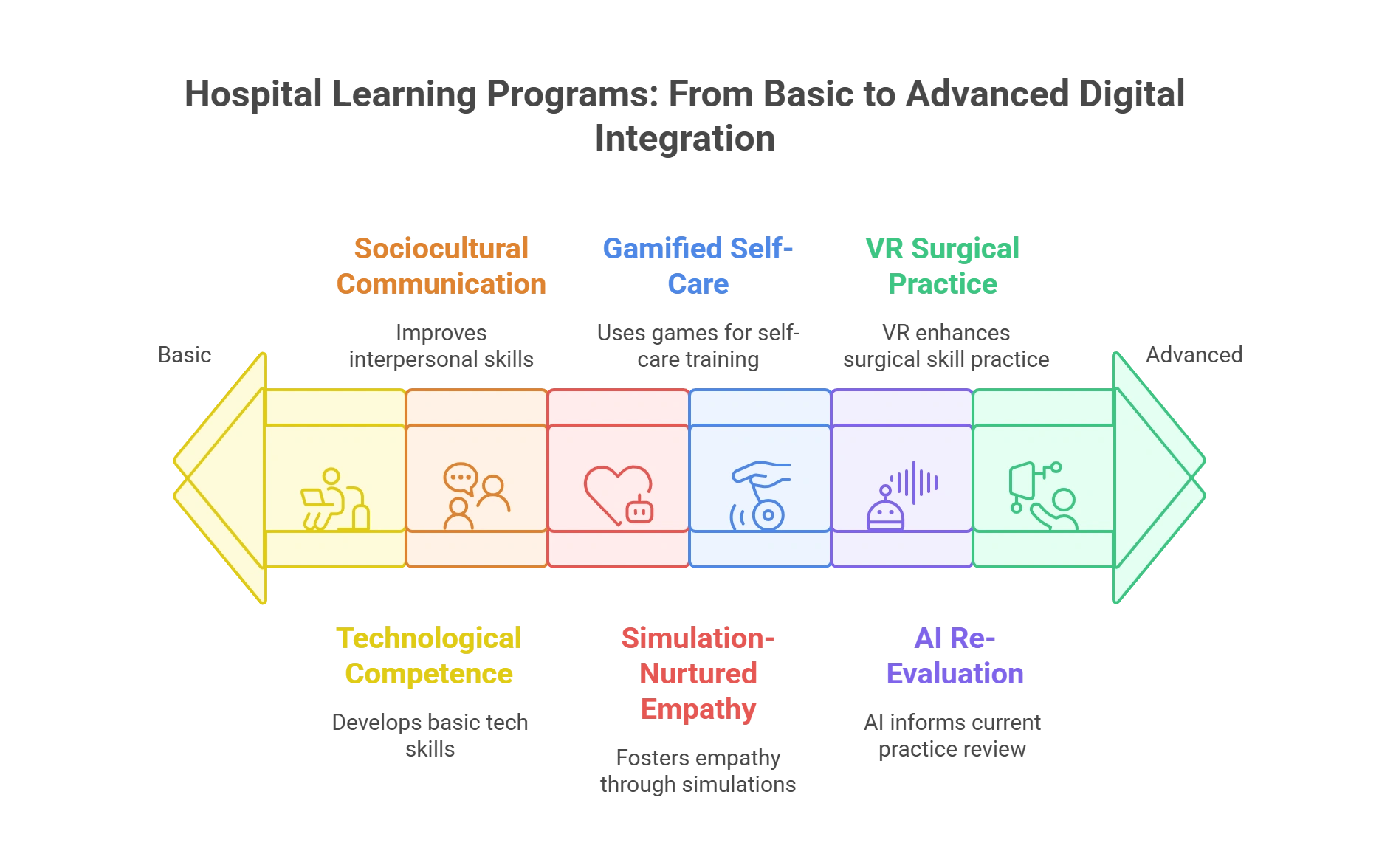
Imbibing the Future Into Hospital Learning Programs
Learning programs have no end; the potential of education and the manner of delivery are vast and constantly growing.
To go beyond learning and development in healthcare, six learning methods can be incorporated into healthcare training initiatives. These methods are:
1. Virtual Reality-Powered Surgical Practice
Virtual Reality (VR) immerses a learner in an environment, and its application in education qualifies as an advanced form of experiential learning. Hospital learning programs can use VR to allow surgeons to acclimate and learn how to use advanced technologies to the fullest extent possible.
Virtual reality-powered hospital learning programs can play a crucial part in improving the competency of healthcare professionals, as shown in a study published in the National Library of Medicine. The study showed that the standard duration of any procedure is 25% faster than that of a VR-trained surgeon and has 80% fewer errors per procedure.
2. Technological Competence
Technological competency development in healthcare is paramount to delivering efficient treatments and maintaining digital records. When hospitals deploy state-of-the-art technology to improve their infrastructure and patient diagnoses, they must also take advantage of hospital learning programs that increase the competence of the professionals who use them.
With the help of digital webinar courses and simulations, hospital learning programs can help doctors and nurses take technological advances by the horns to save lives efficiently.
3. Sociocultural and Interpersonal Communication
Hospital learning programs can help healthcare professionals improve their treatment of patients from diverse cultural backgrounds.
Along with training programs to strengthen advanced cardiac life support (ACLS) competency, doctors and nurses can only reap the benefits of these clinical skills enhancement training with vital soft skills such as communication. With interpersonal and sociocultural learning modules, effortless connections and clear interactions can be made amidst more dire or complicated situations.
4. Simulation-Nurtured Empathy
Empathy is a vital element of compassion. Delivering quality patient care becomes challenging without the ability to comprehend the patient’s situation.
Hospital learning programs that can use simulations to replicate real-world scenarios aid healthcare professionals in gaining a deeper understanding of their patients’ emotions. This, in turn, enables them to provide superior, compassionate care.
5. Gamified Self-Care Training
With compassion and empathy, healthcare professionals have a high chance of emotional and physical burnout.
Incorporating a gamified approach to hospital learning programs could help staff learn better self-care practices with compelling game elements such as rewards and points to keep themselves in top condition for their patients.
6. AI-Based Current Practice Re-Evaluation
Practices exist to be improved and foolproofed. For the healthcare industry, instances of correction through near misses or failures must be minimized, if not eliminated, considering that lives are at stake. Thus, hospital staff training modules incorporating AI-based solutions for their Failure Mode Effect Analyses (FMEA) have tremendous value.
Takeaway
By incorporating technology into your healthcare training strategy, you can offer your healthcare staff the resources they require to remain up-to-date, confident, and proficient in their jobs.
In addition to empowering employees, technologically enabled training improves patient experiences and the general quality of care throughout your organization.
If you’re looking for reliable EdTech training solutions, contact Hurix Digital. Our training programs guarantee interesting and educational experiences that encourage staff members, improve output, and produce the intended outcomes.
Contact us to learn more about our services!
Summarize with:

Senior Vice President
Julia brings over 20 years of global experience in digital learning and business strategy. She specializes in client success, enterprise learning solutions, and driving growth through innovation, with a focus on AI, VR, and emerging technologies across diverse industry verticals.
 A Space for Thoughtful
A Space for Thoughtful 